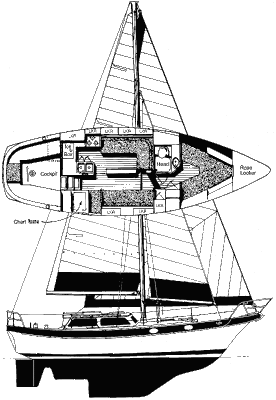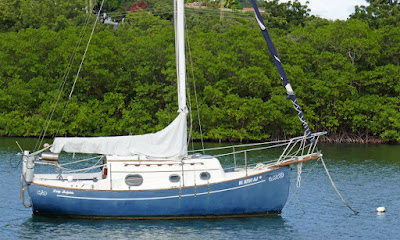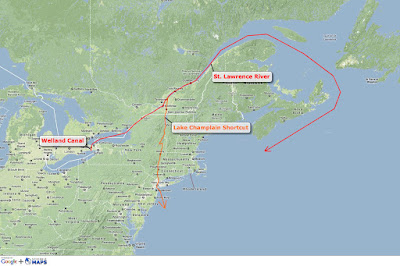Homeport, sweet Homeport
"Relatively speaking you make me who I am. I need you exactly like the ocean needs the land."
As much as I love being on the water, there's truth in John Denver's lyrics above - "the ocean needs the land". The contrast between soil and sea makes each come alive. You've probably read about a sailor's senses being awakened at the first whiff of land after a long passage. Even miles out to sea and hours or days away from landfall, our bodies sense the contrast. Land is a necessary component of sailing, even for those of us who enjoy the journeys more than the destinations. And so, I'm giving my homeport of Muskegon, Michigan some blog love.
To the uniformed and many sailors and powerboaters alike, Muskegon is nothing more than a large, safe harbor from Lake Michigan's gales. You can exit the "big lake" through Muskegon's two outstretched arms of limestone boulders and then meander down a dredged channel through sand dunes on into Muskegon Lake. At 4,150 acres, Muskegon Lake is at the mouth of Michigan's second-largest river and is itself a huge freshwater playground complete with dune beaches and at least one quiet anchorage. If the big lake (Lake Michigan) is too gnarly for even the hardiest sailors, the approximately 4 mile stretch to the far eastern shore is still a worthy run. But what about the land surrounding the lake? And the city that is the namesake?
 |
| An early spring look to the west from our marina over the expanse of Muskegon Lake. |
I stumbled on a chapter in Ron Dwelle's Summer Studies - Retro Cruising on the Great Lakes that stirred my curiosity about Muskegon's history.
Here's a snippet:
"Muskegon was cosmopolitan in those days. There was a large contingent of Dutch Calvinist immigrants who settled there, hoping to indulge their strict religious teachings. But the town was most famous for its sin - particularly the whorehouses and saloons frequented by the lumber jacks, river drivers, mill men, and sailors - the "Timber Beasts" as they called themselves - who normally left their entire paychecks in one or another of the waterfront dives. Among the Beasts, it was said that you could smell Muskegon whiskey 50 miles upriver at Big Rapids. And 25 miles offshore in the Big Lake, they said, you could sniff the first whiff of the perfume on the whores."
Beasts. Whiskey. Whores. All the makings of a Hollywood classic. I had to know more.
Muskegon, like most port towns, is and always has been largely defined and sustained by its connection to water. The name "Muskegon" is derived from the Ottawa Indian term 'Masquigon' meaning "marshy river or swamp" or more simply "the river with marshes". Human occupation in the area probably goes back seven or either thousand years to Paleo-Indian hunters who lived here after the retreat of the glaciers. Next were the woodland Indians, most notably various bands of the Ottawa and Pottawatomi tribes. Archeologists and history books tell us the area was first used as a winter home for the tribes who would retreat up the river into the thick forests to seek shelter when heavy weather came ashore. There's also lore that says a great battle took place between the nomadic Algonquins and the local farming Potawatomi, the aftermath of which is said to have left thousands dead near the mouth of the Muskegon River, very close to our marina. The developed shorelines and hundreds of pleasures boats plying the waters here today belie that historic tragedy.
The 'Masguigon' river is shown on French maps from as far back as the late seventeenth century. After early fur traders first began taking up residence in the area in the late 1700's, official settlement of Muskegon began in 1837 when Muskegon Township was organized and the lumber companies moved in. This period was the commencement of the area's lumber industry and what many view as the most historic and romantic era for the region.
At the peak of the lumber industry, sometime in the mid-1880's, there were at least 47 sawmills around Muskegon Lake and another 16 or so to the north on the shores of White Lake. By this time, Muskegon was known as the "Lumber Queen of the Midwest". The river itself served as a highway of logs and profits as the forests along its shores and tributaries were cut down and boomed up in Muskegon Lake. Schooners carried the lumber mostly to Chicago and Milwaukee to build those cities and many others to the west in Illinois and Iowa. In fact, it was Muskegon lumber that rebuilt Chicago after the Great Fire of 1871.
Dwelle says that during the 1880's, Muskegon mills averaged enough white pine to build a city the size of Chicago each year, and there were commonly 100 lumber schooners in the lake with 40 to 50 departing on a normal day. White pines, and to a lesser extent other tree species, brought riches and all the associated plagues that come with it. During the lumbering era, Muskegon boasted more millionaires than any other town in America.
For those so inclined, you can read all about the debauchery that ensued along the waterfront area known as "Dust Flats" because of the accumulation of sawdust that littered the shore and filled shallow areas of Muskegon Lake. When the trees ran out, the whiskey and whores weren't far behind and the town lay collapsed after a booming period. The city later rebuilt itself as an industrial port, only to collapse again during the rust belt era that followed World War II.
Even today, the bottom of Muskegon Lake is still littered with sunken logs from the lumbering days. I'm sure we're not the only boaters on the lake to have snagged one of these waterlogged relics when retrieving our anchor. I'm told there are still plenty of places where you can dig down through a couple of feet of sand and hit a thick layer of sawdust. History might be sunken and buried, but its not gone.
There's power in knowing history. But there's also affection. Before we switched homeports, I didn't think much of Muskegon or Muskegon Lake. After we moved our sailboat here almost 5 years ago, I found a natural affinity for Muskegon Lake and her easy access to Lake Michigan, but still wasn't too keen on the city itself. Now that I've spent some time there and took a peek back at the history of this place, I have a new respect for how it was shaped and the influence its had on the region. Relatively speaking, the lake makes the city what it is and the city makes the lake too. They need each other, exactly like the ocean needs the land.
Here's more of what we love so much about where the water meets the land in a place called Muskegon (Click the pic for a bigger view):
 |
| Looking east from the dunes at the west end of Muskegon Lake on a typical summer weekend |
 |
| Anchored in our favorite spot on the lake |
 |
| Looking west at Lake Michigan from the other side of the dunes shown a couple pictures above |
 |
| Yeehaw! |
 |
| Can you believe all that beach gear fits in the dinghy? It does (barely)! |





Comments
Post a Comment